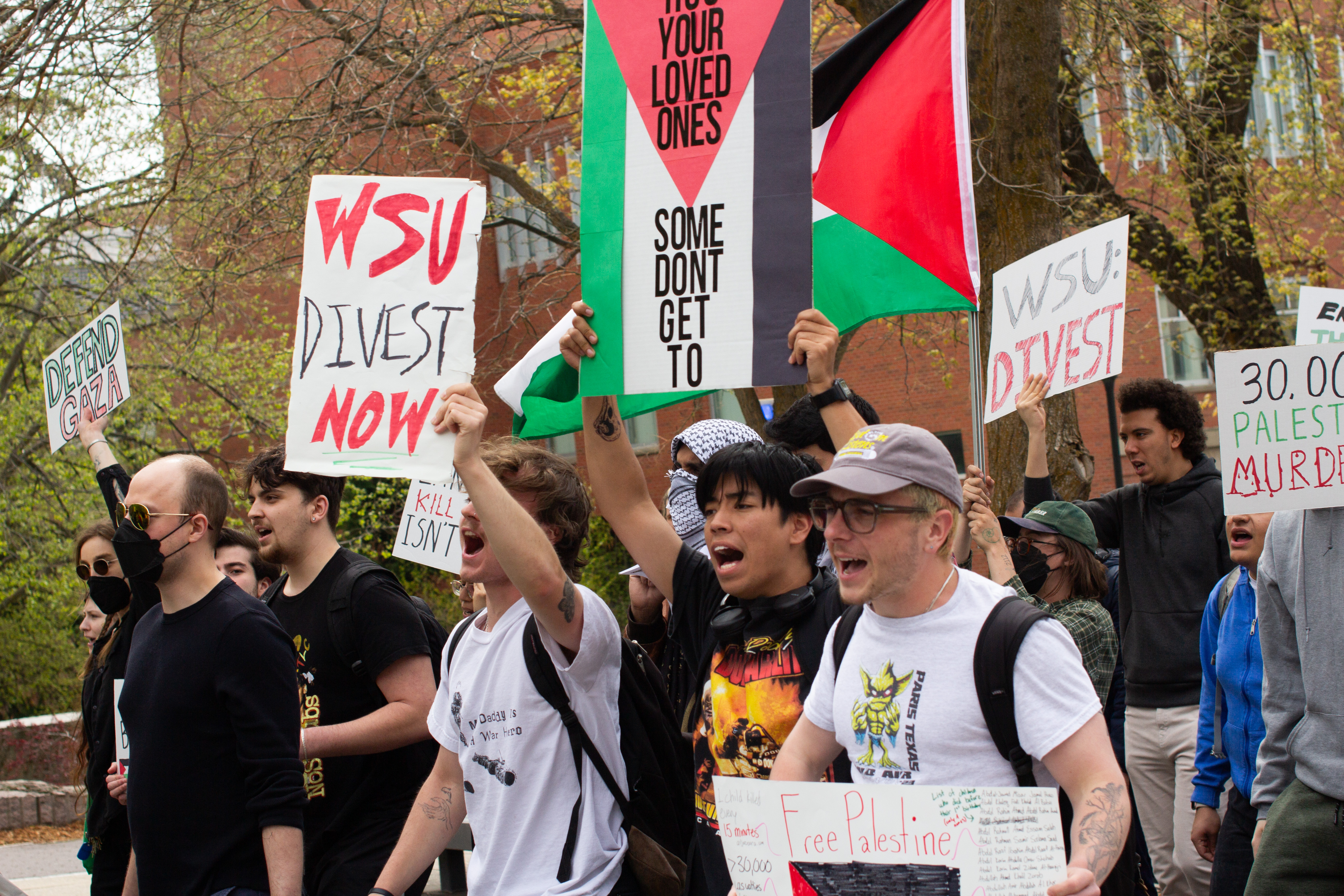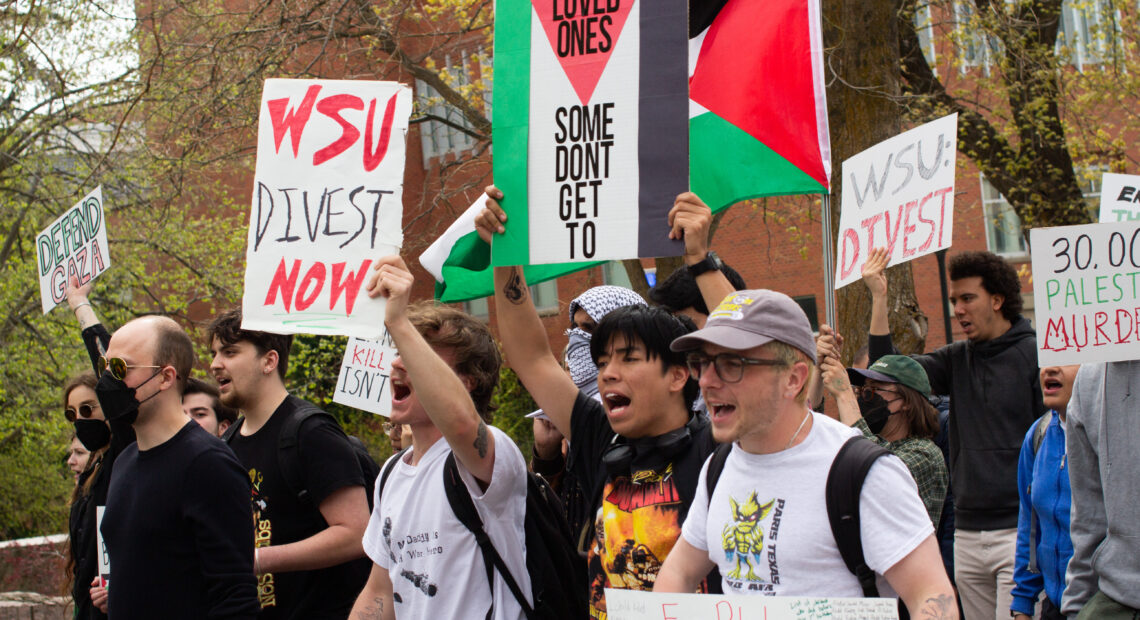
WSU, UI students join protests of U.S. support to Israel
Listen
(Runtime 3:46)
Read
In March, MSNBC reported that more children had been killed in the span of four months in Gaza than in four years of war globally. At least 97 journalists and media workers have been killed in Gaza since Oct. 7, according to the Committee to Protect Journalists, along with almost 500 healthcare workers and 196 aid workers.
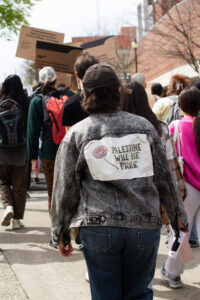
A student wearing a “Palestine will be free” jacket walks with other protestors Wednesday afternoon at Washington State University. (Credit: Rachel Sun / NWPB)
Connor Luce, a first-year mechanical engineering student at WSU, helped organize the Pullman campus protest.
“[WSU’s] money is still being invested in companies that are actively perpetrating, actively facilitating the ongoing genocide and apartheid in Palestine,” Luce said, “and they’ve not done a damn thing.”
Petitions for the WSU and UI groups are online to ask the universities to divest.
Organizers said calls for divestment at both universities were modeled after similar resolutions adopted by universities to divest from apartheid in South Africa in the 1980s.
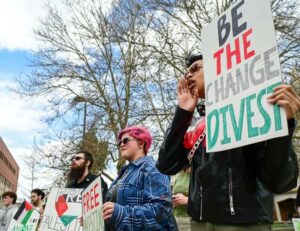
Protestors gathered at the University of Idaho library in Moscow hold posters and listen to speakers, including UI freshman Basil Hennes, center, and Autumn Austin. (Credit: Liesbeth Powers/Moscow-Pullman Daily News)
Nick Koenig, a doctoral researcher at the UI, said they read the 1985 resolution adopted by the university’s board of directors that stated no funds managed by the foundation would be invested in companies doing business in South Africa unless those companies subscribed to racial fairness and equality.
“This is something we can do today,” Koenig said. “It is a method that the University of Idaho has done in the past, and it has to do it now.”
Students also called on the politicians representing them to end their support for Israel’s military campaign.
One student organizer, who declined to share his name, specifically called out U.S. Senator Jim Risch, R-Idaho, for voting against a ceasefire, and blocking $75 million in food aid for Palestinians.
That student led a chant, joined by a few dozen protesters:
“Jim Risch, Jim Risch, where’s your heart? How many Gazans did you starve?” Students chanted. “From Palestine to the Philippines, end the U.S. war machine.”
Justin Vo, a fourth-year architecture student at WSU, said he felt compelled to protest because of his family’s experience during the Vietnam War.
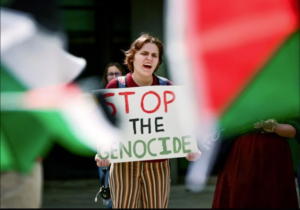
Mary Wren, a third-year University of Idaho student, is framed by Palestinian flags while shouting in agreement with a speaker at the Palestine Week of Action demonstration on campus in Moscow Thursday. (Credit: Liesbeth Powers/Moscow-Pullman Daily News)
“My family has been suffering from that war for so long,” Vo said. “It has been curating a sense of humanity in me, and a recognition of why America should never repeat such a tremendous mistake like that.”
Sullivan Abrams, a freshman political science major at WSU, came to the protest with a sign, “Never again, for anyone.”
“I’m Jewish. I have been raised with a lot of talk about genocide and human rights,” Abrams said. “I think that it’s especially important to show up for Palestinians and the genocide that is going on in Gaza.”
Abrams said he believes pro-Palestinian protests being assumed to be antisemitic is a gross misunderstanding of what the movement represents.
Antisemitic incidents have risen in the United States since the Oct. 7 attack on Israel by Hamas. Abrams said that antisemitism needs to be called out. But, he said, support for Palestinians is not antisemitic.
Arabella Laras, a 20-year-old WSU fashion modeling sophomore, said she had been using her social media to help fundraise for people living in Gaza.
“They are just 19 years old or younger than that. That makes me feel so bad,” she said. “Like, when I’m just here studying and enjoying my life, and on the other side of the world my peers are suffering. They don’t have food, they don’t have anything for breakfast, and basically they have nothing.”
Seyi Arogundade, a first-year journalism and political science double major at UI, spoke against Israel’s offensive in Gaza and criticized the Legislature and student government for not doing more to divest from it.
“An entire nation, people and culture is being wiped away,” she said. “There are people who stand by and say nothing and do nothing. That is not right.”
Roughly 85 to 100 people joined the protest at WSU, and several dozen joined the protest at the UI. No counter protesters were present at either.

